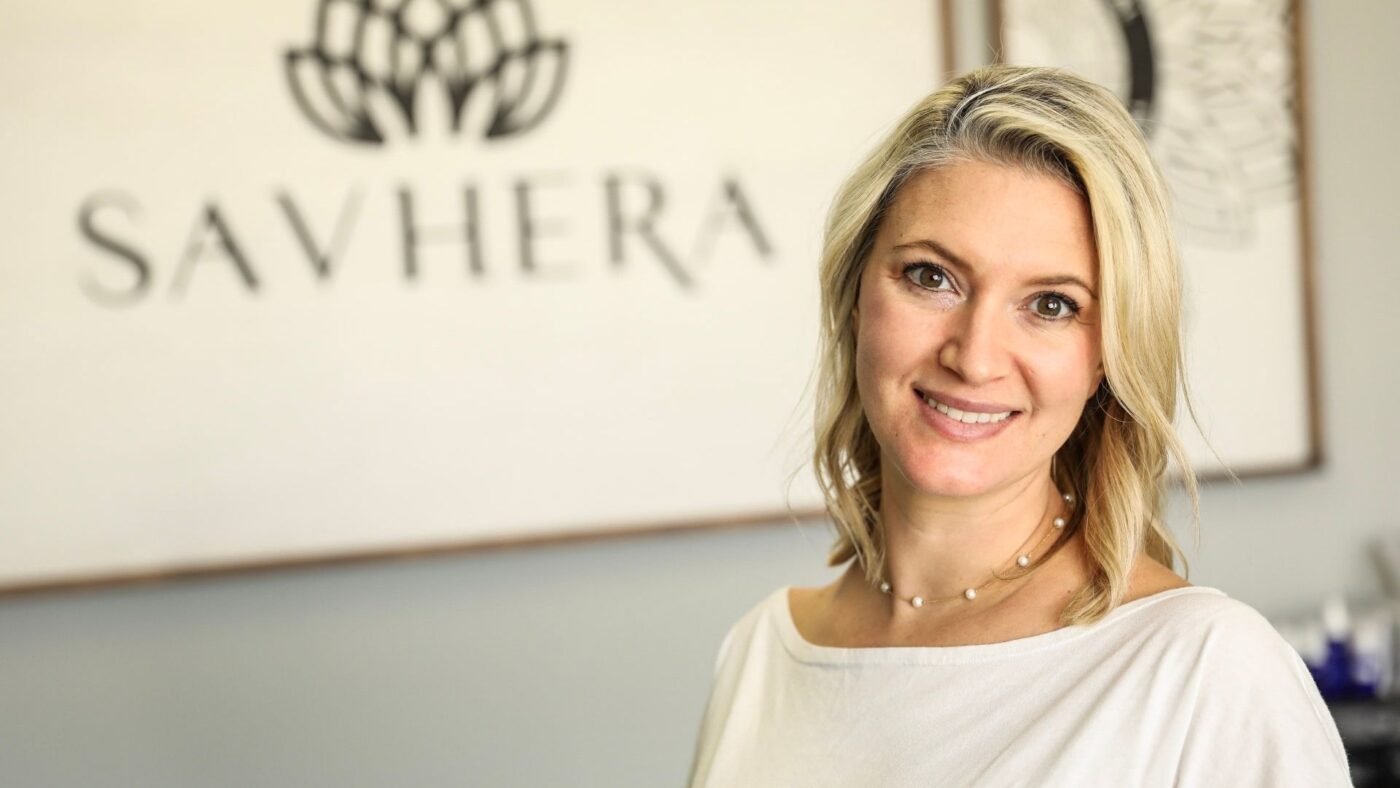Savhera, a natural wellness company and social enterprise, offers employment opportunities to victims of sex trafficking.
December 2021

Vanessa Bouché, cofounder of Savhera.
“Why should I share my story with you? You’re no different than the people who come here and exploit my body; you’re exploiting my story. And you’ll probably go home and write a book about my story, publish it, and make money off of it, which makes you no different than a trafficker.” These blunt words from a woman in Delhi’s red-light district inspired Vanessa Bouché to find a way to help others like her to find dignified employment. She co-founded Savhera, a business offering medical and dental health coverage, safe living conditions, intellectual growth, and individual empowerment to the trafficking survivors in Delhi working for the company.
Bouché is an associate professor of political science at Texas Christian University and an award-winning scholar who has earned over $1 million in federal research grants for her work on human trafficking.
Bouché has been invited speaker by U.S. Consulates in Mumbai and Kolkata, the United Nations Office on Drugs and Crime, the U.S. Agency for International Development, Polaris, which serves as a data hub for the anti-human trafficking field, the think tank McCain Institute, and Thorn, which builds technology to defend children from sexual abuse.
Excerpts from an interview with Bouché on her work, the challenges she faced and how Savhera provides a new beginning for victim of sex trafficking.
Your teaching and research interests include sex trafficking in the United States and globally. Can you tell us about your work in this field?
I have been researching the issue of sex trafficking for about 15 years. I have surveyed hundreds of trafficking survivors, interviewed convicted traffickers in prison, analyzed legislation and prosecutions of human trafficking, assessed the economic impact of certain segments of the underground commercial sex economy, and examined types of organized criminal enterprises engaged in human trafficking, among other things. In doing this work, I have partnered with many NGOs, government agencies and academics and have met incredible leaders and overcomers who are doing incredible work to advance freedom.
What was your experience on working on sex trafficking in India?
I started working in India in 2014 and was introduced to an outstanding organization, Shakti Vahini, who has been on the frontlines of anti-trafficking work in India since 1997. Much of what I have learned and experienced has come from them, as well as the groundbreaking research of Dr. P.M. Nair and others. What I have experienced in India is not vastly different to what I’ve experienced in other parts of the globe, including the United States. Fundamentally, sex trafficking is an issue rooted in intersectional oppression within longstanding systems of discrimination based on race, ethnicity, religion, class, caste, gender and sexuality. The sex trafficking survivors that I have come to know have experienced or been subject to one or all of the following circumstances either before or during the time they were trafficked: lack of education, lack of healthcare, lack of financial independence, domestic violence, child marriage, sexual violence, and geographic and social mobility.
What is Savhera and how did you conceptualize it?
Savhera Wellness is a company that provides living wage, sustainable, dignified employment to survivors of sex trafficking in Delhi. In 2017, I was leading a study abroad program in Delhi. We were sitting on the floor of a medical clinic in the red-light district engaging with some of the women who were resting there. One of the women said, “Why should I share my story with you? You’re no different than the people who come here and exploit my body; you’re exploiting my story. And you’ll probably go home and write a book about my story, publish it and make money off of it, which makes you no different than a trafficker.” When I asked her what she needed, she said, “I need dignified employment to get out of this dirty business.” I told her that I would help her.
My plan was to connect her with a social enterprise that was already providing employment or vocational training to women exiting the brothels in Delhi. Much to my surprise, I was unable to find anything. I started Savhera in order to follow through on my commitment to this one woman that I would help.

How are women employed in Savhera doing now?
Our Savhera employees are doing phenomenally well! They have all moved out of the brothels and are living in their own places. They all have their own bank accounts. They all know how to read and write. They all know how to take public transportation and get around the city they call home.
What have been the biggest challenges and successes with Savhera?
Savhera faces all the challenges of a normal start-up including managing cash flow, building systems and processes, and creating quality products. On top of all of that, our business model rests on providing people with jobs, and not just any people, but those who are coming from trauma and exploitation and without many transferable skills. Managing the basic needs of our employees–ensuring they are living in a safe place, setting up a bank account, training them on how to navigate public transportation, teaching them how to read and write–takes a lot of time beyond job training. Doing all of this as a start-up during a global pandemic and economic recession was even harder!
Nevertheless, we have had many successes, including the fact that many women now have hope and a future as a result of their employment with Savhera.
Are there plans for expansion and more ways to help women victims of sex trafficking?
Currently, we are focused on continuing to improve our product and process as we increase our sales in the international market. When we expand, we will be hiring more women in Delhi. There are an estimated 4,000 to 6,000 women in the brothels in Delhi, and I have yet to meet a single one who wants to be there. We want to grow Savhera so that more and more of these women can experience the same freedom and independence that our current employees now live every day.
Natasa Milas is a freelance writer based in New York City.
COMMENTS